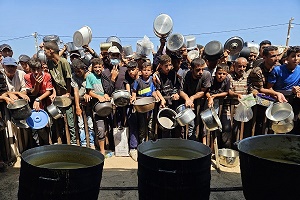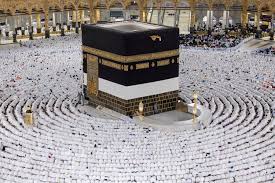By Ayomide Otitoju
More than 1.3 million Muslim pilgrims have arrived in Mecca ahead of the 2025 hajj, as Saudi authorities ramp up heat mitigation efforts and security measures to safeguard worshippers amid soaring desert temperatures and a crackdown on unregistered pilgrims.
The annual pilgrimage, which begins Wednesday, is taking place under intense conditions with temperatures expected to exceed 40 degrees Celsius. Last year’s hajj saw 1,301 deaths, mostly linked to extreme heat, as temperatures peaked at 51.8°C (125.2°F).
Saudi officials say they have mobilised 250,000 personnel across 40 agencies and introduced extensive reforms to prevent a repeat of 2024’s fatalities. Expanded shaded areas, thousands of additional medical staff, and more than 400 cooling units are being deployed across Mecca and surrounding sites.
“We have increased shaded areas by 50,000 square metres and enhanced surveillance through drones and AI systems to better manage the flow of pilgrims,” Hajj Minister Tawfiq al-Rabiah told AFP.
Despite the precautions, the health ministry reported 44 heatstroke cases on Monday as temperatures crossed 40°C. The timing of this year’s pilgrimage again falls during one of the hottest periods in the lunar calendar.
The hajj, one of the five pillars of Islam, is a mandatory religious duty for all Muslims with the physical and financial ability to perform it at least once in their lifetime. Each year, millions journey to the Kingdom for the multi-day rituals in Mecca, Mina, Arafat, and Muzdalifah.
Saudi authorities have also intensified a campaign against unregistered pilgrims, deploying drones, conducting raids, and issuing warnings via SMS. Unregistered individuals risk arrest, deportation, and a 10-year entry ban. Last year’s casualties were predominantly among those without permits, who lacked access to air-conditioned facilities.
Hajj permits are allocated to countries through a quota system and distributed to individuals by lottery. However, the high costs of participation often prompt many to attempt the pilgrimage unofficially.
Reflecting on the experience, 52-year-old Mariama from Senegal said the hajj fulfilled a lifelong aspiration. “I was dreaming about it, thinking about it every time to come here to do the hajj,” she said.
For Nigerian pilgrim Abdulhamid, 27, the scorching conditions have been intense. “It’s very, very, very hot,” he said, noting he never leaves his lodging without sunglasses. Despite the heat, he expressed joy at making the pilgrimage for the second consecutive year.
Saudi Arabia, which earns billions annually from hajj and year-round umrah pilgrimages, views the event as a source of both religious prestige and economic significance. The monarch holds the title of Custodian of the Two Holy Mosques, underscoring the country’s central role in the Islamic world.
As one of the world’s largest religious gatherings, the hajj remains both a logistical challenge and a profound spiritual journey for Muslims across the globe.










